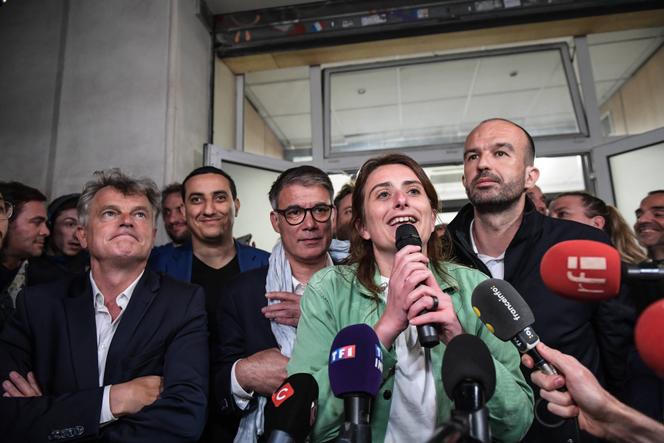
Out with the NUPES, in with the Popular Front. Seven months after the implosion of the former left-wing alliance, the New Popular Ecological and Social Union, France’s left-wing parties have succeeded in laying the foundations of a new alliance in record time, ahead of the snap elections on June 30 and July 7. On Monday, June 10, the four leaders of the main left-wing parties, Marine Tondelier (Greens), Olivier Faure (Socialists), Fabien Roussel (Communists), and Manuel Bompard (La France Insoumise, LFI) appeared side by side at around 10:30 pm outside the headquarters of the Green party in Paris to announce the “constitution of a new Popular Front,” bringing together “all the forces of the humanist left, trade unions, associations and citizens.”
The name had been launched the day before by LFI lawmaker François Ruffin, in the wake of the dissolution of the Assemblée Nationale by President Emmanuel Macron. “The Popular Front is a commitment that goes far beyond ourselves,” Faure, the Socialist leader, said as he left the meeting on Monday. Like in the parliamentary elections of 2022, the announcement of the creation of the alliance came before the conclusion of an agreement on a policy platform. For now, the left is focused on agreeing to avoid the worst, by making the dissolution an opportunity rather than a guaranteed catastrophe in the face of the far right. Disagreements persist, though, in terms of policy. “Each side is advancing on its red lines,” said Faure on Tuesday morning.
But the left’s determination has already reassured many politicians. “They can’t back out of this, because the first person to do so will end up with their head on a spike,” said Sandrine Rousseau, a prominent Green MP. The degree of optimism about the alliance varies. The center-left Place Publique, Raphaël Glucksmann‘s party and a signatory to this preliminary agreement, has a very different view. In the evening, Aurore Lalucq, the party’s co-president, who was present at the discussions, made it clear on X that their signing of the preliminary agreement in no way represented “an agreement, just the opening of discussions.”
“We are the only ones capable of preventing disaster,” warned LFI lawmaker Clémentine Autain, who wants “to transform the combined votes for the left into political momentum.”
If the agreement holds, the left will have partly foiled Macron’s bet that its disunity would bring it to its knees after a fratricidal campaign in the parliamentary elections. To achieve this, LFI agreed to abandon the NUPES policy platform, which was largely similar to party leader Jean-Luc Mélenchon’s platform for the 2022 presidential campaign. The threat of the far right and the prospect of potentially losing many seats in the Assemblée Nationale seems to have brought each party back to its senses. And at record speed, even if there is still some way to go.
You have 68.71% of this article left to read. The rest is for subscribers only.